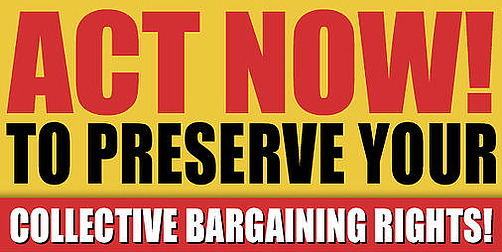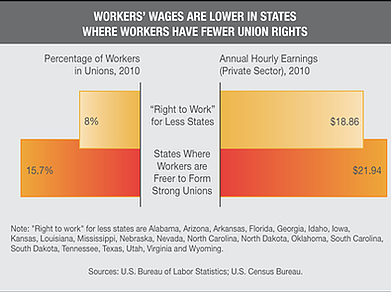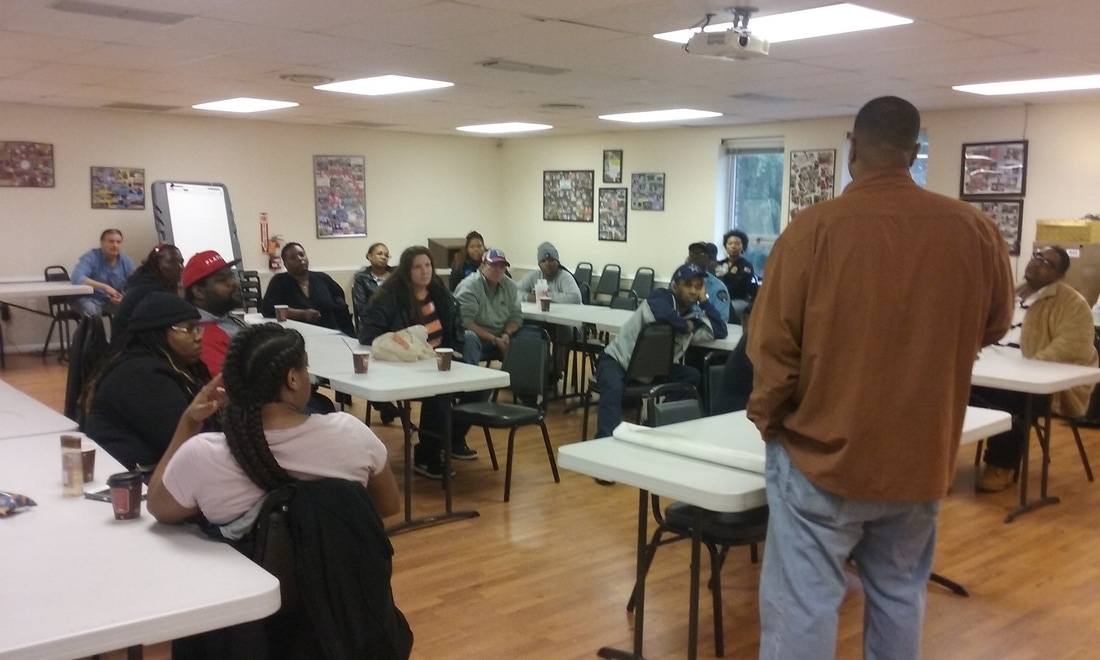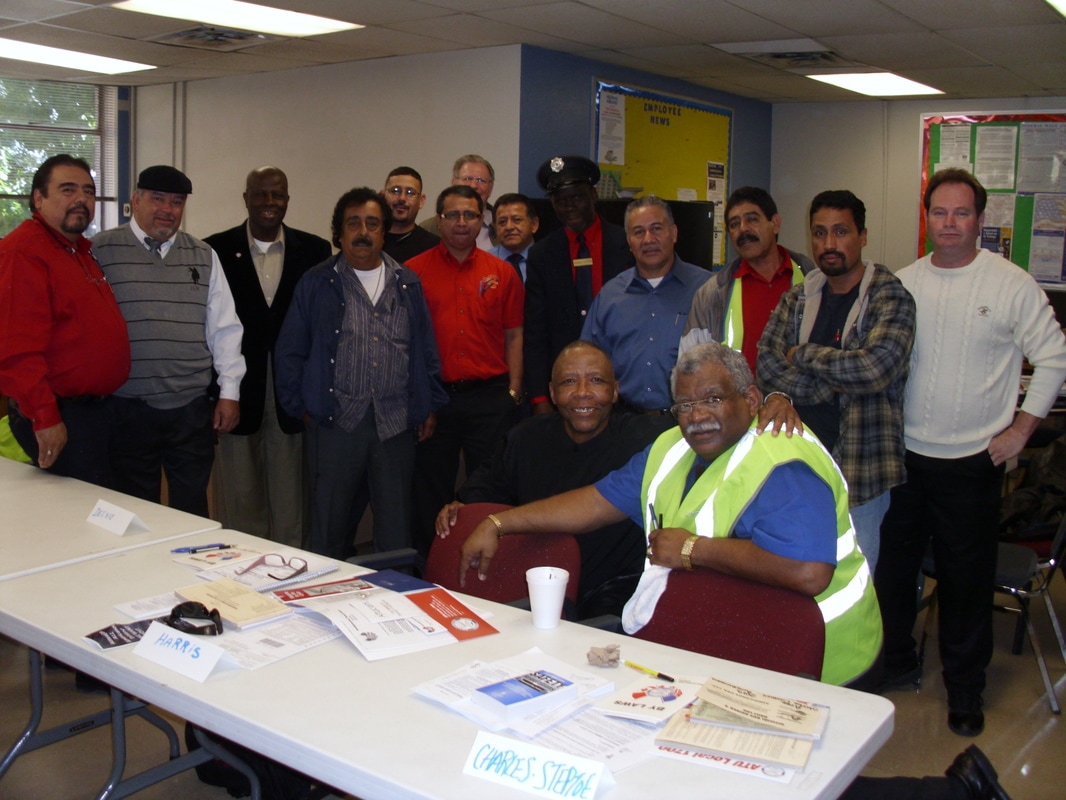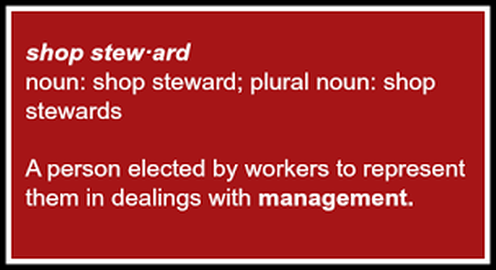Collective Bargaining Rights
Collective Bargaining Rights
Collective bargaining is the process in which working people, through their unions, negotiate contracts with their employers to determine their terms of employment, including pay, benefits, hours, leave, job health and safety policies, ways to balance work and family and more. Collective bargaining is a way to solve workplace problems.
Congress Encourages Collective Bargaining Rights for Workers
Below is the exact wording from the National Labor Relations Act
It is declared to be the policy of the United States to eliminate the causes of certain substantial obstructions to the free flow of commerce and to mitigate and eliminate these obstructions when they have occurred by encouraging the practice and procedure of collective bargaining and by protecting the exercise by workers of full freedom of association, self- organization, and designation of representatives of their own choosing, for the purpose of negotiating the terms and conditions of their employment or other mutual aid or protection.
Notice of Bargaining Obligation NLRB
Management and Union Rights and Obligations in Collective Bargaining
Employee Rights Under the National Labor Relations Act
Labor and Employment Law Seminar Private Sector Bargaining
Federal Labor Laws The Duty to Bargain
The Union Difference
Union members earn better wages and benefits than workers who aren’t union members. On average, union workers’ wages are 27 percent higher than their nonunion counterparts.
Unionized workers are 60 percent more likely to have employer-provided pensions.
More than 85 percent of union workers have jobs that provide health insurance benefits, but only 54 percent of nonunion workers do. Unions help employers create a more stable, productive workforce—where workers have a say in improving their jobs.
Unions help bring workers out of poverty and into the middle class. In fact, in states where workers don’t have union rights, workers’ incomes are lower.
Collective bargaining is the process in which working people, through their unions, negotiate contracts with their employers to determine their terms of employment, including pay, benefits, hours, leave, job health and safety policies, ways to balance work and family and more. Collective bargaining is a way to solve workplace problems.
Congress Encourages Collective Bargaining Rights for Workers
Below is the exact wording from the National Labor Relations Act
It is declared to be the policy of the United States to eliminate the causes of certain substantial obstructions to the free flow of commerce and to mitigate and eliminate these obstructions when they have occurred by encouraging the practice and procedure of collective bargaining and by protecting the exercise by workers of full freedom of association, self- organization, and designation of representatives of their own choosing, for the purpose of negotiating the terms and conditions of their employment or other mutual aid or protection.
Notice of Bargaining Obligation NLRB
Management and Union Rights and Obligations in Collective Bargaining
Employee Rights Under the National Labor Relations Act
Labor and Employment Law Seminar Private Sector Bargaining
Federal Labor Laws The Duty to Bargain
The Union Difference
Union members earn better wages and benefits than workers who aren’t union members. On average, union workers’ wages are 27 percent higher than their nonunion counterparts.
Unionized workers are 60 percent more likely to have employer-provided pensions.
More than 85 percent of union workers have jobs that provide health insurance benefits, but only 54 percent of nonunion workers do. Unions help employers create a more stable, productive workforce—where workers have a say in improving their jobs.
Unions help bring workers out of poverty and into the middle class. In fact, in states where workers don’t have union rights, workers’ incomes are lower.
As the charts illustrate, 88 percent of workers in unions participate in pension plans versus 49 percent of nonunion workers. Seventy-seven percent of union workers have guaranteed pensions, compared with 17 percent of nonunion workers. Roughly 84 percent of workers in unions have paid sick leave compared with 62 percent of nonunion workers.
In states that have laws restricting workers' rights to form strong unions, the average pay for all workers is lower. So-called right to work for less laws that limit workers' rights to collectively bargain contracts (including wages and benefits) are a bad deal for all workers. In 2010, average pay in so-called right to work states was 14 percent lower than in states where workers have the freedom to form strong unions.
In states that have laws restricting workers' rights to form strong unions, the average pay for all workers is lower. So-called right to work for less laws that limit workers' rights to collectively bargain contracts (including wages and benefits) are a bad deal for all workers. In 2010, average pay in so-called right to work states was 14 percent lower than in states where workers have the freedom to form strong unions.
|
Unions are about a simple proposition: By joining together, working women and men gain strength in numbers so they can have a voice at work about what they care about. They negotiate a contract with their employer for things like a fair and safe workplace, better wages, a secure retirement and family-friendly policies such as paid sick leave and scheduling hours. They have a voice in how their jobs get done, creating a more stable, productive workforce that provides better services and products. Always adapting to the challenges of our nation’s evolving workforce, unions are meeting the needs of workers in today’s flexible and nontraditional work environments. Because no matter what type of job workers are in, by building power in unions, they can speak out for fairness for all working people in their communities and create better standards and a strong middle class across the country.
|
The process through which a labor union and an employer negotiate the scope of the employment relationship.
A collective bargaining agreement is the ultimate goal of the collective bargaining process. Typically, the agreement establishes wages, hours, promotions, benefits, and other employment terms as well as procedures for handling disputes arising under it. Because the collective bargaining agreement cannot address every workplace issue that might arise in the future, unwritten customs and past practices, external law, and informal agreements are as important to the collective bargaining agreement as the written instrument itself.
Collective bargaining allows workers and employers to reach voluntary agreement on a wide range of topics. Even so, it is limited to some extent by federal and state laws. A collective bargaining agreement cannot accomplish by contract what the law prohibits. For example, a union and an employer cannot use collective bargaining to deprive employees of rights they would otherwise enjoy under laws such as the civil rights statutes (Alexander v. Gardner-Denver Co., 415 U.S. 36, 94 S. Ct. 1011, 39 L. Ed. 2d 147 [1974]). Collective bargaining also cannot be used to waive rights or obligations that laws impose on either party. For example, an employer may not use collective bargaining to reduce the level of safety standards it must follow under the occupational safety and health act (29 U.S.C.A. §§ 651 et seq.). Furthermore, the collective bargaining agreement is not purely voluntary. One party's failure to reach agreement entitles the other to resort to certain legal tactics, such as strikes and lockouts, to apply economic pressure and force agreement. Moreover, unlike commercial contracts governed by state law, the collective bargaining agreement is governed almost exclusively by federal labor law, which determines the issues that require collective bargaining, the timing and method of bargaining, and the consequences of a failure to bargain properly or to adhere to a collective bargaining agreement.
National Labor Relations ActCongress passed the National Labor Relations Act (NLRA) (29 U.S.C.A. §§ 151 et seq.) in 1935 to establish the right of workers to engage in collective bargaining and other group activities (§ 157). The NLRA also created the national labor relations board (NLRB), a federal agency authorized to enforce the right to bargain collectively (§ 153). The NLRA has been amended several times since 1935, most notably in 1947, 1959, and 1974.
The NLRA governs labor relations for businesses involved in interstate commerce only; thus, it does not protect the collective bargaining interests of all categories of workers. Several classes of employers fall outside the NLRA, including those working for the U.S. government and its wholly owned corporations, states and their political subdivisions, railroads, and airlines. The NLRA also does not protect certain types of workers, such as agricultural workers, independent contractors, and supervisory and managerial employees. But other federal and state laws often provide protection for workers not covered under the NLRA. For example, federal government workers enjoy the right to bargain collectively under the Civil Service Reform Act of 1978, which is patterned largely after the NLRA and enforced by the Federal Labor Relations Authority. Railroads and airlines are generally governed by the Railway Labor Act, the predecessor to the NLRA. Plus many states have adopted statutes similar to the NLRA that protect the rights of state and local government workers to bargain collectively.
Sections 8(a)(5) and 8(b)(3) of the NLRA define the failure to engage in collective bargaining as an unfair labor practice (29 U.S.C.A. § 158[a][5], [b][3]). The aggrieved party may file an unfair labor practice charge with the NLRB, which has the authority to prevent or halt the performance of unfair labor practices (§ 160).
Law of Collective BargainingThe law of collective bargaining encompasses four basic points:
A majority of the workers in a bargaining unit must designate a representative with the sole or exclusive right to represent them in negotiations with the employer's representative (29 U.S.C.A. § 159[a]). The employer is not required to bargain with an unauthorized representative (§ 158[a][5]). Once a valid representative has been selected, even workers who do not belong to the union are bound by the collective bargaining agreement and cannot negotiate individual contracts with the employer (J. I. Case Co. v. NLRB, 321 U.S. 332, 64 S. Ct. 576, 88 L. Ed. 762 [1944]). As a corollary, the employer may not extend different terms to any workers in the bargaining unit, even if those terms are more favorable, unless the collective bargaining agreement contemplates flexible terms (Emporium Capwell Co. v. Western Addition Community Organization, 420 U.S. 50, 95 S. Ct. 977, 43 L. Ed. 2d 12 [1975]).
Once the NLRB certifies a union as the exclusive bargaining agent, the union enjoys an irrebuttable presumption of majority support for one year (Fall River Dyeing & Finishing Corp. v. NLRB, 482 U.S. 27, 107 S. Ct. 2225, 96 L. Ed. 2d 22 [1987]). During that year, the employer may not refuse to bargain with the union on the ground that the union does not represent a majority of employees. After that year expires, the employer may rebut the presumption that the union represents a majority of employees by showing either that the union in fact does not enjoy majority support or that the employer has a good faith doubt founded on sufficient objective evidence that the union has lost majority support (NLRB v. Curtin Matheson Scientific, 494 U.S. 775, 110 S. Ct. 1542, 108 L. Ed. 2d 801 [1990]). In cases where the employer doubts that a union enjoys majority support, the employer may "anticipatorily withdraw" recognition of the union by insisting on a collective bargaining agreement that will terminate with the end of the certification year (Rock-Tenn Co. v. NLRB, 69 F.3d 803 [7th Cir. 1995]).
Similarly, a successor employer may not simply refuse to recognize the union for bargaining purposes. Instead, courts have required successor employers to recognize the incumbent union if "substantial continuity" exists between both employers (NLRB v. Burns Security Service, 406 U.S. 272, 92 S. Ct. 1571, 32 L. Ed. 2d 61 [1972]). To determine whether there is substantial continuity, courts will consider, among other factors, whether both employers are engaged in the same business, whether the employees perform substantially similar tasks under both employers, whether the customer base remains much the same, and whether the successor employer continues to use the same industrial or business processes as its predecessor (Frye v. Specialty Envelope, 10 F.3d 1221 [6th Cir. 1993]).
Mandatory Subjects of Bargaining
Although the parties need not bargain over every conceivable topic, they must bargain in good faith over mandatory subjects of bargaining, which include wages, hours, and other "terms and conditions of employment" (29 U.S.C.A. § 158[d]). Because these mandatory subjects are very broad, courts over the years have attempted to set standards for determining whether a specific bargaining topic is mandatory. Generally, terms and conditions of employment encompass only issues that "settle an aspect of the relationship between the employer and the employees" (Allied Chemical & Alkali Workers of America v. Pittsburgh Plate Glass Co., 404 U.S. 157, 92 S. Ct. 383, 30 L. Ed. 2d 341 [1971]).
If one party wishes to bargain over a mandatory subject, it is an unfair labor practice for the other to refuse. Other topics are permissive subjects of bargaining, and it may be an unfair labor practice for a party to demand bargaining over them (NLRB v. Wooster Division of Borg-Warner Corp., 356 U.S. 342, 78 S. Ct. 718, 2 L. Ed. 2d 823 [1958]). Thus, although the parties must bargain to an impasse over mandatory subjects of bargaining before implementing unilateral changes, they may change permissive subjects unilaterally without bargaining and cannot be forced to bargain over such changes.
Although most of the decisions an employer makes will affect employees, not all are mandatory subjects of bargaining. Some decisions, such as advertising and product selection, bear such an indirect relationship to and have such a minimal effect on the employment relationship that they are almost certainly only permissive subjects of bargaining. Other decisions, such as those regarding hiring, layoffs, and plant rules, are so directly relevant to the employment relationship that they are almost certainly mandatory subjects of bargaining. Still other decisions are not aimed at the employment relationship but have a sizable effect on it and are thus difficult to categorize as permissive or mandatory bargaining subjects (First National Maintenance Corp. v. NLRB, 452 U.S. 666, 101 S. Ct. 2573, 69 L. Ed. 2d 318 [1981] [citing Fibreboard Paper Products v. NLRB, 379 U.S. 203, 85 S. Ct. 398, 13 L. Ed. 2d 233 (1964) [Stewart, J., concurring]). The Supreme Court has attempted on several occasions to define the scope of mandatory bargaining for this third category of management decisions.
In Fibreboard, the Supreme Court held that under its three-part analysis, an employer's decision to subcontract out a portion of its operations was a mandatory bargaining subject. First, subcontracting falls within the literal meaning of the NLRA phrase "terms and conditions of employment." Second, determining that subcontracting is a mandatory bargaining subject effectuates the purposes of the NLRA by "bringing a problem of vital concern to labor and management within the framework established by Congress as most conducive to industrial peace"—namely, collective bargaining. Third, other employers in the same industry have addressed contracting out in the bargaining process, rather than leaving it to managerial discretion. Justice potter stewart added in his concurrence that subjects that "lie at the core of entrepreneurial control," such as decisions about "the commitment of investment capital and the basic scope of the enterprise," are not mandatory subjects of bargaining.
In First National Maintenance, the Court addressed whether an employer's decision to terminate certain operations entirely constituted a mandatory subject of bargaining. The Court, relying primarily on Justice Stewart's concurrence in Fibreboard, held that the decision to terminate all operations at a particular site was an economically motivated management decision that was separate from the employment relationship, even though it obviously affected job security. The Court noted, however, that the effects of the employer's decision, such as severance pay and benefits, were mandatory subjects of bargaining under section 8(a)(5) of the NLRA. Accordingly, under this Fibreboard-First National Maintenance framework, most significant economic decisions, such as plant shutdowns, layoffs, and relocations, are not mandatory subjects of bargaining, even though the employer must engage in "effects bargaining" as a result of them.
Duty to Bargain in Good Faith
During the bargaining process, the parties are not required by law to reach agreement. They must, however, bargain in good faith (29 U.S.C.A. § 158[d]). Although good faith is a somewhat subjective concept, courts will look to the entire circumstances surrounding bargaining, including behavior away from the bargaining table such as pressure and threats (NLRB v. Billion Motors, 700 F.2d 454 [8th Cir. 1983]). Most authorities agree that an absolute refusal to bargain constitutes bad faith (Wooster).
Even so, one party's insistence on a certain contract term is not necessarily an unfair labor practice. The NLRB and the courts that review and enforce its orders are unwilling to substitute their judgment for that of the parties and will not judge the content of collective bargaining agreements (NLRB v. American National Insurance Co., 343 U.S. 395, 72 S. Ct. 824, 96 L. Ed. 1027 [1952]). In addition, the use of "economic weapons" such as pressure tactics, picketing, and strikes to force bargaining concessions is not necessarily bad faith bargaining (NLRB v. Insurance Agents' International Union, 361 U.S. 477, 80 S. Ct. 419, 4 L. Ed. 2d 454 [1960]).
The refusal to comply with an information request may constitute bad faith. For example, in NLRB v. Truitt Manufacturing Co., 351 U.S. 149, 76 S. Ct. 753, 100 L. Ed. 1027 (1956), the employer committed an unfair labor practice when it refused to supply the union with information supporting its claim that it could not afford to pay a wage increase the union demanded. Over the years, courts have clarified that employers' claims of an inability to pay requested wage increases are conceptually distinct from claims that wage increases will result in a competitive disadvantage (United Steelworkers of America v. NLRB, 983 F.2d 240 [D.C. Cir. 1993]). Accordingly, in Graphic Communications International Union Local 508 v. NLRB, 977 F.2d 1168 (7th Cir. 1992), the court held that an employer was not required to disclose financial information unless it had asserted specifically that it was unable to pay a requested wage increase; an employer's claim that a wage increase would lead to competitive disadvantage did not require it to disclose wage information.
However, a refusal to provide requested information is not necessarily an unfair labor practice. For example, in Detroit Edison Co. v. NLRB, 440 U.S. 301, 99 S. Ct. 1123, 59 L. Ed. 2d 333 (1979), the Supreme Court held that an employer's refusal to provide a union with confidential test results was not an unfair labor practice, where the company would have violated the right to privacy of the tested employees by disclosing the results.
Unilateral Changes During the time a collective bargaining agreement is in effect, the employer may not change a working condition that is a mandatory subject of bargaining, without first bargaining with the union (29 U.S.C.A. § 158[d]). Even after the collective bargaining agreement expires, the employer must maintain the status quo and may not unilaterally change mandatory subjects of bargaining, until the parties have reached an impasse (Louisiana Dock Co. v. NLRB, 909 F.2d 281 [7th Cir. 1990]). This proscription against unilateral changes continues even if the employer disputes that the union is the exclusive representative (Livingston Pipe & Tube v. NLRB, 987 F.2d 422 [7th Cir. 1993]; NLRB v. Parents & Friends of the Specialized Living Center, 879 F.2d 1442 [7th Cir. 1989]). Once good faith negotiations between the parties "exhaust the prospect of concluding agreement," the parties have reached an impasse, and implementing unilateral changes in working conditions does not constitute an unfair labor practice (NLRB v. Plainville Ready Mix Concrete Co., 44 F.3d 1320 [6th Cir. 1995]; United Paperworkers International Union v. NLRB, 981 F.2d 861 [6th Cir. 1992]; Southwest Forest Industry v. NLRB, 841 F.2d 270 [9th Cir. 1988]).
A pre-impasse unilateral change to a mandatory subject of bargaining generally constitutes an unfair labor practice, even though employees may regard the change as beneficial. According to the Supreme Court, unilateral changes minimize the influence of collective bargaining by giving employees the impression that a union is unnecessary to achieve agreement with the employer. For example, in NLRB v. Katz, 369 U.S. 736, 82 S. Ct. 1107, 8 L. Ed. 2d 230 (1962), the employer unilaterally changed its sick leave policy and increased its wage rates without first bargaining over them with the union. The Court ruled that the employer's unilateral change undermined the union's ability to negotiate over sick leave, wages, and other terms of employment.
One area of ongoing conflict between unions and employers concerns when wage increases constitute mandatory subjects of bargaining. In Acme Die Casting v. NLRB, 26 F.3d 162 (D.C. Cir. 1994), the court of appeals analyzed the employer's historical practice of establishing the frequency and size of wage increases and determined that whether to grant a wage increase was not an issue within the employer's discretion and could not be decided without bargaining with the union (see also Daily News of Los Angeles v. NLRB, 979 F.2d 1571 [D.C. Cir. 1992] [remanding to NLRB to determine whether wage increases that are consistent in terms of timing but discretionary in terms of amount are considered mandatory subjects of bargaining]).
One area of ongoing conflict between unions and employers concerns when wage increases constitute mandatory subjects of bargaining. In Acme Die Casting v. NLRB, 26 F.3d 162 (D.C. Cir. 1994), the court of appeals analyzed the employer's historical practice of establishing the frequency and size of wage increases, and determined that whether to grant a wage increase was not an issue within the employer's discretion and could not be decided without bargaining with the union.
As of 2003, the U.S. Supreme Court had not resolved this issue of whether wage increases were mandatory subjects of collective bargaining, so the federal courts of appeals have developed rules of their own to govern this question. Where an employer does not exercise discretion in determining the timing or the amount of a wage increase, then the issue of wage increases is a mandatory subject for collective bargaining. NLRB v. Beverly Enter.-Mass., Inc., 174 F.3d 13 (1st Cir. 1999). Moreover, even if an employer exercises a certain amount of discretion in determining wage increase, such as an annual increase to cover the costs of living, this fact does not prevent the wage increase from becoming a mandatory subject if the company has a longstanding practice of granting such pay increases. NLRB v. Pepsi-Cola Bottling Co., No. 00-1969, 2001 WL 791645 (4th Cir. July 13, 2001).
Once the parties have reached an impasse, the employer may implement unilateral changes to mandatory bargaining subjects as long as it has previously proposed those changes to the union (NLRB v. Plainville Ready Mix Concrete Co., 44 F.3d 1320 [6th Cir. 1995]; NLRB v. Emsing's Supermarket, 872 F.2d 1279 [7th Cir. 1989]).
A collective bargaining agreement is the ultimate goal of the collective bargaining process. Typically, the agreement establishes wages, hours, promotions, benefits, and other employment terms as well as procedures for handling disputes arising under it. Because the collective bargaining agreement cannot address every workplace issue that might arise in the future, unwritten customs and past practices, external law, and informal agreements are as important to the collective bargaining agreement as the written instrument itself.
Collective bargaining allows workers and employers to reach voluntary agreement on a wide range of topics. Even so, it is limited to some extent by federal and state laws. A collective bargaining agreement cannot accomplish by contract what the law prohibits. For example, a union and an employer cannot use collective bargaining to deprive employees of rights they would otherwise enjoy under laws such as the civil rights statutes (Alexander v. Gardner-Denver Co., 415 U.S. 36, 94 S. Ct. 1011, 39 L. Ed. 2d 147 [1974]). Collective bargaining also cannot be used to waive rights or obligations that laws impose on either party. For example, an employer may not use collective bargaining to reduce the level of safety standards it must follow under the occupational safety and health act (29 U.S.C.A. §§ 651 et seq.). Furthermore, the collective bargaining agreement is not purely voluntary. One party's failure to reach agreement entitles the other to resort to certain legal tactics, such as strikes and lockouts, to apply economic pressure and force agreement. Moreover, unlike commercial contracts governed by state law, the collective bargaining agreement is governed almost exclusively by federal labor law, which determines the issues that require collective bargaining, the timing and method of bargaining, and the consequences of a failure to bargain properly or to adhere to a collective bargaining agreement.
National Labor Relations ActCongress passed the National Labor Relations Act (NLRA) (29 U.S.C.A. §§ 151 et seq.) in 1935 to establish the right of workers to engage in collective bargaining and other group activities (§ 157). The NLRA also created the national labor relations board (NLRB), a federal agency authorized to enforce the right to bargain collectively (§ 153). The NLRA has been amended several times since 1935, most notably in 1947, 1959, and 1974.
The NLRA governs labor relations for businesses involved in interstate commerce only; thus, it does not protect the collective bargaining interests of all categories of workers. Several classes of employers fall outside the NLRA, including those working for the U.S. government and its wholly owned corporations, states and their political subdivisions, railroads, and airlines. The NLRA also does not protect certain types of workers, such as agricultural workers, independent contractors, and supervisory and managerial employees. But other federal and state laws often provide protection for workers not covered under the NLRA. For example, federal government workers enjoy the right to bargain collectively under the Civil Service Reform Act of 1978, which is patterned largely after the NLRA and enforced by the Federal Labor Relations Authority. Railroads and airlines are generally governed by the Railway Labor Act, the predecessor to the NLRA. Plus many states have adopted statutes similar to the NLRA that protect the rights of state and local government workers to bargain collectively.
Sections 8(a)(5) and 8(b)(3) of the NLRA define the failure to engage in collective bargaining as an unfair labor practice (29 U.S.C.A. § 158[a][5], [b][3]). The aggrieved party may file an unfair labor practice charge with the NLRB, which has the authority to prevent or halt the performance of unfair labor practices (§ 160).
Law of Collective BargainingThe law of collective bargaining encompasses four basic points:
- The employer may not refuse to bargain over certain subjects with the employees' representative, provided that the employees' representative has majority support in the bargaining unit.
- Those certain subjects, called mandatory subjects of bargaining, include wages, hours, and other terms and conditions of employment.
- The employer and the union are not required to reach agreement but must bargain in good faith over mandatory subjects of bargaining until they reach an impasse.
- While a valid collective bargaining agreement is in effect, and while the parties are bargaining but have not yet reached an impasse, the employer may not unilaterally change a term of employment that is a mandatory subject of bargaining. But once the parties have reached an impasse, the employer may unilaterally implement its proposed changes, provided that it had previously offered the changes to the union for consideration.
A majority of the workers in a bargaining unit must designate a representative with the sole or exclusive right to represent them in negotiations with the employer's representative (29 U.S.C.A. § 159[a]). The employer is not required to bargain with an unauthorized representative (§ 158[a][5]). Once a valid representative has been selected, even workers who do not belong to the union are bound by the collective bargaining agreement and cannot negotiate individual contracts with the employer (J. I. Case Co. v. NLRB, 321 U.S. 332, 64 S. Ct. 576, 88 L. Ed. 762 [1944]). As a corollary, the employer may not extend different terms to any workers in the bargaining unit, even if those terms are more favorable, unless the collective bargaining agreement contemplates flexible terms (Emporium Capwell Co. v. Western Addition Community Organization, 420 U.S. 50, 95 S. Ct. 977, 43 L. Ed. 2d 12 [1975]).
Once the NLRB certifies a union as the exclusive bargaining agent, the union enjoys an irrebuttable presumption of majority support for one year (Fall River Dyeing & Finishing Corp. v. NLRB, 482 U.S. 27, 107 S. Ct. 2225, 96 L. Ed. 2d 22 [1987]). During that year, the employer may not refuse to bargain with the union on the ground that the union does not represent a majority of employees. After that year expires, the employer may rebut the presumption that the union represents a majority of employees by showing either that the union in fact does not enjoy majority support or that the employer has a good faith doubt founded on sufficient objective evidence that the union has lost majority support (NLRB v. Curtin Matheson Scientific, 494 U.S. 775, 110 S. Ct. 1542, 108 L. Ed. 2d 801 [1990]). In cases where the employer doubts that a union enjoys majority support, the employer may "anticipatorily withdraw" recognition of the union by insisting on a collective bargaining agreement that will terminate with the end of the certification year (Rock-Tenn Co. v. NLRB, 69 F.3d 803 [7th Cir. 1995]).
Similarly, a successor employer may not simply refuse to recognize the union for bargaining purposes. Instead, courts have required successor employers to recognize the incumbent union if "substantial continuity" exists between both employers (NLRB v. Burns Security Service, 406 U.S. 272, 92 S. Ct. 1571, 32 L. Ed. 2d 61 [1972]). To determine whether there is substantial continuity, courts will consider, among other factors, whether both employers are engaged in the same business, whether the employees perform substantially similar tasks under both employers, whether the customer base remains much the same, and whether the successor employer continues to use the same industrial or business processes as its predecessor (Frye v. Specialty Envelope, 10 F.3d 1221 [6th Cir. 1993]).
Mandatory Subjects of Bargaining
Although the parties need not bargain over every conceivable topic, they must bargain in good faith over mandatory subjects of bargaining, which include wages, hours, and other "terms and conditions of employment" (29 U.S.C.A. § 158[d]). Because these mandatory subjects are very broad, courts over the years have attempted to set standards for determining whether a specific bargaining topic is mandatory. Generally, terms and conditions of employment encompass only issues that "settle an aspect of the relationship between the employer and the employees" (Allied Chemical & Alkali Workers of America v. Pittsburgh Plate Glass Co., 404 U.S. 157, 92 S. Ct. 383, 30 L. Ed. 2d 341 [1971]).
If one party wishes to bargain over a mandatory subject, it is an unfair labor practice for the other to refuse. Other topics are permissive subjects of bargaining, and it may be an unfair labor practice for a party to demand bargaining over them (NLRB v. Wooster Division of Borg-Warner Corp., 356 U.S. 342, 78 S. Ct. 718, 2 L. Ed. 2d 823 [1958]). Thus, although the parties must bargain to an impasse over mandatory subjects of bargaining before implementing unilateral changes, they may change permissive subjects unilaterally without bargaining and cannot be forced to bargain over such changes.
Although most of the decisions an employer makes will affect employees, not all are mandatory subjects of bargaining. Some decisions, such as advertising and product selection, bear such an indirect relationship to and have such a minimal effect on the employment relationship that they are almost certainly only permissive subjects of bargaining. Other decisions, such as those regarding hiring, layoffs, and plant rules, are so directly relevant to the employment relationship that they are almost certainly mandatory subjects of bargaining. Still other decisions are not aimed at the employment relationship but have a sizable effect on it and are thus difficult to categorize as permissive or mandatory bargaining subjects (First National Maintenance Corp. v. NLRB, 452 U.S. 666, 101 S. Ct. 2573, 69 L. Ed. 2d 318 [1981] [citing Fibreboard Paper Products v. NLRB, 379 U.S. 203, 85 S. Ct. 398, 13 L. Ed. 2d 233 (1964) [Stewart, J., concurring]). The Supreme Court has attempted on several occasions to define the scope of mandatory bargaining for this third category of management decisions.
In Fibreboard, the Supreme Court held that under its three-part analysis, an employer's decision to subcontract out a portion of its operations was a mandatory bargaining subject. First, subcontracting falls within the literal meaning of the NLRA phrase "terms and conditions of employment." Second, determining that subcontracting is a mandatory bargaining subject effectuates the purposes of the NLRA by "bringing a problem of vital concern to labor and management within the framework established by Congress as most conducive to industrial peace"—namely, collective bargaining. Third, other employers in the same industry have addressed contracting out in the bargaining process, rather than leaving it to managerial discretion. Justice potter stewart added in his concurrence that subjects that "lie at the core of entrepreneurial control," such as decisions about "the commitment of investment capital and the basic scope of the enterprise," are not mandatory subjects of bargaining.
In First National Maintenance, the Court addressed whether an employer's decision to terminate certain operations entirely constituted a mandatory subject of bargaining. The Court, relying primarily on Justice Stewart's concurrence in Fibreboard, held that the decision to terminate all operations at a particular site was an economically motivated management decision that was separate from the employment relationship, even though it obviously affected job security. The Court noted, however, that the effects of the employer's decision, such as severance pay and benefits, were mandatory subjects of bargaining under section 8(a)(5) of the NLRA. Accordingly, under this Fibreboard-First National Maintenance framework, most significant economic decisions, such as plant shutdowns, layoffs, and relocations, are not mandatory subjects of bargaining, even though the employer must engage in "effects bargaining" as a result of them.
Duty to Bargain in Good Faith
During the bargaining process, the parties are not required by law to reach agreement. They must, however, bargain in good faith (29 U.S.C.A. § 158[d]). Although good faith is a somewhat subjective concept, courts will look to the entire circumstances surrounding bargaining, including behavior away from the bargaining table such as pressure and threats (NLRB v. Billion Motors, 700 F.2d 454 [8th Cir. 1983]). Most authorities agree that an absolute refusal to bargain constitutes bad faith (Wooster).
Even so, one party's insistence on a certain contract term is not necessarily an unfair labor practice. The NLRB and the courts that review and enforce its orders are unwilling to substitute their judgment for that of the parties and will not judge the content of collective bargaining agreements (NLRB v. American National Insurance Co., 343 U.S. 395, 72 S. Ct. 824, 96 L. Ed. 1027 [1952]). In addition, the use of "economic weapons" such as pressure tactics, picketing, and strikes to force bargaining concessions is not necessarily bad faith bargaining (NLRB v. Insurance Agents' International Union, 361 U.S. 477, 80 S. Ct. 419, 4 L. Ed. 2d 454 [1960]).
The refusal to comply with an information request may constitute bad faith. For example, in NLRB v. Truitt Manufacturing Co., 351 U.S. 149, 76 S. Ct. 753, 100 L. Ed. 1027 (1956), the employer committed an unfair labor practice when it refused to supply the union with information supporting its claim that it could not afford to pay a wage increase the union demanded. Over the years, courts have clarified that employers' claims of an inability to pay requested wage increases are conceptually distinct from claims that wage increases will result in a competitive disadvantage (United Steelworkers of America v. NLRB, 983 F.2d 240 [D.C. Cir. 1993]). Accordingly, in Graphic Communications International Union Local 508 v. NLRB, 977 F.2d 1168 (7th Cir. 1992), the court held that an employer was not required to disclose financial information unless it had asserted specifically that it was unable to pay a requested wage increase; an employer's claim that a wage increase would lead to competitive disadvantage did not require it to disclose wage information.
However, a refusal to provide requested information is not necessarily an unfair labor practice. For example, in Detroit Edison Co. v. NLRB, 440 U.S. 301, 99 S. Ct. 1123, 59 L. Ed. 2d 333 (1979), the Supreme Court held that an employer's refusal to provide a union with confidential test results was not an unfair labor practice, where the company would have violated the right to privacy of the tested employees by disclosing the results.
Unilateral Changes During the time a collective bargaining agreement is in effect, the employer may not change a working condition that is a mandatory subject of bargaining, without first bargaining with the union (29 U.S.C.A. § 158[d]). Even after the collective bargaining agreement expires, the employer must maintain the status quo and may not unilaterally change mandatory subjects of bargaining, until the parties have reached an impasse (Louisiana Dock Co. v. NLRB, 909 F.2d 281 [7th Cir. 1990]). This proscription against unilateral changes continues even if the employer disputes that the union is the exclusive representative (Livingston Pipe & Tube v. NLRB, 987 F.2d 422 [7th Cir. 1993]; NLRB v. Parents & Friends of the Specialized Living Center, 879 F.2d 1442 [7th Cir. 1989]). Once good faith negotiations between the parties "exhaust the prospect of concluding agreement," the parties have reached an impasse, and implementing unilateral changes in working conditions does not constitute an unfair labor practice (NLRB v. Plainville Ready Mix Concrete Co., 44 F.3d 1320 [6th Cir. 1995]; United Paperworkers International Union v. NLRB, 981 F.2d 861 [6th Cir. 1992]; Southwest Forest Industry v. NLRB, 841 F.2d 270 [9th Cir. 1988]).
A pre-impasse unilateral change to a mandatory subject of bargaining generally constitutes an unfair labor practice, even though employees may regard the change as beneficial. According to the Supreme Court, unilateral changes minimize the influence of collective bargaining by giving employees the impression that a union is unnecessary to achieve agreement with the employer. For example, in NLRB v. Katz, 369 U.S. 736, 82 S. Ct. 1107, 8 L. Ed. 2d 230 (1962), the employer unilaterally changed its sick leave policy and increased its wage rates without first bargaining over them with the union. The Court ruled that the employer's unilateral change undermined the union's ability to negotiate over sick leave, wages, and other terms of employment.
One area of ongoing conflict between unions and employers concerns when wage increases constitute mandatory subjects of bargaining. In Acme Die Casting v. NLRB, 26 F.3d 162 (D.C. Cir. 1994), the court of appeals analyzed the employer's historical practice of establishing the frequency and size of wage increases and determined that whether to grant a wage increase was not an issue within the employer's discretion and could not be decided without bargaining with the union (see also Daily News of Los Angeles v. NLRB, 979 F.2d 1571 [D.C. Cir. 1992] [remanding to NLRB to determine whether wage increases that are consistent in terms of timing but discretionary in terms of amount are considered mandatory subjects of bargaining]).
One area of ongoing conflict between unions and employers concerns when wage increases constitute mandatory subjects of bargaining. In Acme Die Casting v. NLRB, 26 F.3d 162 (D.C. Cir. 1994), the court of appeals analyzed the employer's historical practice of establishing the frequency and size of wage increases, and determined that whether to grant a wage increase was not an issue within the employer's discretion and could not be decided without bargaining with the union.
As of 2003, the U.S. Supreme Court had not resolved this issue of whether wage increases were mandatory subjects of collective bargaining, so the federal courts of appeals have developed rules of their own to govern this question. Where an employer does not exercise discretion in determining the timing or the amount of a wage increase, then the issue of wage increases is a mandatory subject for collective bargaining. NLRB v. Beverly Enter.-Mass., Inc., 174 F.3d 13 (1st Cir. 1999). Moreover, even if an employer exercises a certain amount of discretion in determining wage increase, such as an annual increase to cover the costs of living, this fact does not prevent the wage increase from becoming a mandatory subject if the company has a longstanding practice of granting such pay increases. NLRB v. Pepsi-Cola Bottling Co., No. 00-1969, 2001 WL 791645 (4th Cir. July 13, 2001).
Once the parties have reached an impasse, the employer may implement unilateral changes to mandatory bargaining subjects as long as it has previously proposed those changes to the union (NLRB v. Plainville Ready Mix Concrete Co., 44 F.3d 1320 [6th Cir. 1995]; NLRB v. Emsing's Supermarket, 872 F.2d 1279 [7th Cir. 1989]).
LEOSU-DC / VA Local 104 Online Shop Steward Training Course
LEOSU-DC / VA Local 104 Online Shop Steward Training Course providing up to date Information for Stewards, Local Union Officers, and LEOSU-DC / VA Local 104 Members who want to know more about their rights, the law & its protections, workplace issues and the benefits of having an LEOSU-DC / VA Local 104 Union Contract.
